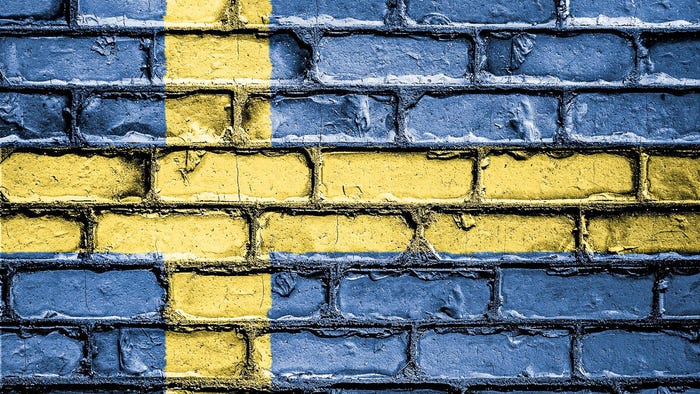Huawei loses in Swedish courts over 5G, again
Court dashes vendor's hopes of an appeal, but Ericsson continues to raise concerns over business in China.

It's been another bad day in court for Huawei, the beleaguered Chinese equipment manufacturer that is being left out in the cold by a growing number of countries around the world.
The latest market to bang firmly into place the "not welcome" sign is Sweden, although given the twists and turns in this particular case, the situation may yet evolve further. The Swedish legal saga had seemed to be concluded in January, when the country's Supreme Administrative Court said regulator PTS could finally go ahead with an auction of spectrum in the 3.5GHz and 2.3GHz frequency bands.
Figure 1:  Brick wall: Huawei is out of Sweden again, while Ericsson frets over retaliation by the Chinese.
Brick wall: Huawei is out of Sweden again, while Ericsson frets over retaliation by the Chinese.
(Source: David Peterson from Pixabay)
The PTS, after consultation with the country's armed forces and the Swedish Security Service, had ruled that Huawei's 5G equipment posed a risk to natural security. The Chinese supplier, insisted the regulator, could not supply new 5G installations following the auction.
Huawei, which has always strongly denied it is a security threat, filed an appeal and hearings began at the Stockholm Administrative Court in April. By this point, Sweden had concluded its spectrum auction, raising the possibility of legal implications should Huawei be successful in its appeal.
Fast forward to June, and the Administrative Court decided to uphold the ban against Huawei selling 5G equipment in the country and rejected the vendor's appeals in two cases concerning conditions for a 5G license. This also means that existing products from Huawei must be discontinued by January 1, 2025.
Ulrika Melin, the court chairman, said: "Sweden's security is of heavy importance and the administrative court has taken into account that only the Security Police and the armed forces together have an overall picture regarding the security situation and the threat to Sweden." The court did admonish the PTS for not communicating with Huawei, but said this did not provide a reason to revoke the decisions.
An unlikely ally
Huawei seemed unsurprised by the ruling and told Reuters it is considering its options. Kenneth Fredriksen, Huawei's EVP, Central East Europe and Nordic Region, said the vendor "will continue to fight for our right to be in the [Swedish] market."
One somewhat unlikely ally for Huawei in Sweden has been its fierce rival Ericsson, although for understandable reasons. Ericsson, Nokia and Samsung have certainly gained from Huawei's pain as operators seek alternative 5G network providers. However, Ericsson is concerned that China might retaliate by blocking access to the Chinese mobile market.
Reuters said Ericsson gets around 10% of its revenue from China. An Ericsson spokesman told the news agency that the PTS decision, now affirmed by the court, "may adversely impact the economic interests of Sweden and Swedish industry, including those of Ericsson."
Meanwhile, in March 2021 the US Council on Foreign Relations provided an update on where Huawei 5G equipment is banned, where access is difficult, and where the vendor's equipment is still used. It indicates that a ban is in effect in Australia, Japan, Luxembourg, Poland, Romania, Sweden, Taiwan, the United Kingdom and the United States. Many more countries have a de facto ban in place following the imposition of strict security criteria that ensure a high bar to entry for Chinese players.
Huawei still going strong
At the same time, Huawei is still a dominant presence despite the concerns about 5G. A recent report from Dell'Oro said the vendor accounted for a 36% revenue share of the overall telecoms equipment market outside North America in Q1 2021.
Stefan Pongratz, vice president at Dell'Oro with responsibility for the mobile RAN market and telecoms capex research, said Huawei's portfolio breath across both the wireless and wireline is contributing to its leadership position.
Want to know more about security? Check out our dedicated security channel here on
Light Reading.
He noted that the vendor was ranked number one in 2020 for all the telecom segments the research firm tracks, including broadband access, microwave and optical transport, mobile core and radio access network (RAN), service provider router and switch. Pongratz pointed out that only three suppliers have solutions in all the segments – Huawei, Nokia and ZTE. "So even if Huawei's addressable market with new 5G contracts is being challenged, it is not surprising Huawei continues to dominate the overall telecom market given its leadership position in multiple technologies," he said.
Related posts:
— Anne Morris, contributing editor, special to Light Reading
About the Author(s)
You May Also Like




.jpg?width=300&auto=webp&quality=80&disable=upscale)







